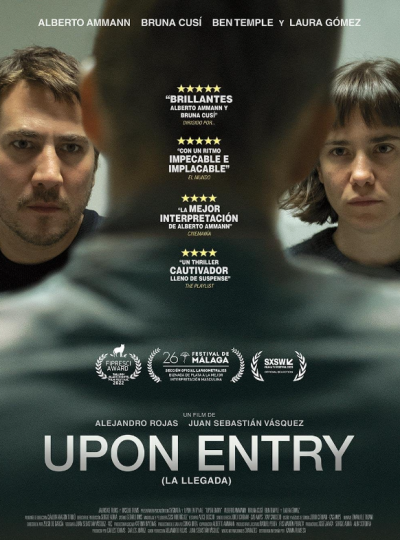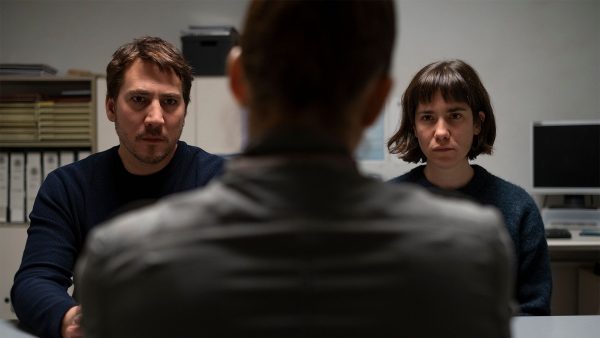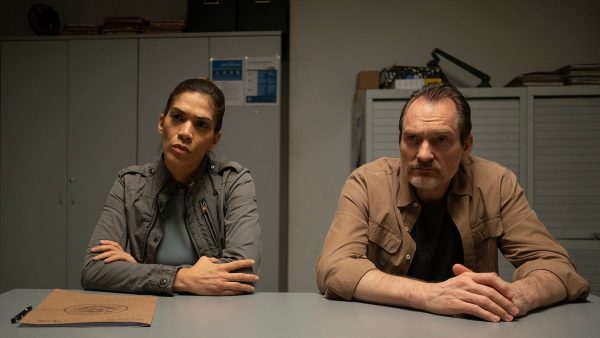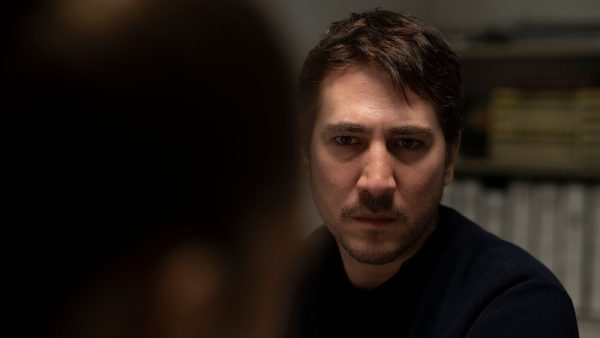‘Upon Entry’ tests our resolve to live up to our contentions

“Upon Entry” (“La Ilegada”) (2022 production, 2023 release). Cast: Alberto Ammann, Bruna Cusí, Ben Temple, Laura Gómez. Director: Alejandro Rojas and Juan Sebastián Vasquez. Screenplay: Alejandro Rojas and Juan Sebastián Vasquez. Web site. Trailer.
Questions related to immigration have been asked with increasing frequency in recent years. This has been particularly true where illegal entry has been concerned, providing considerable fodder for widespread public debate. But what of legal immigration – is that a benign subject, one worthy of little attention or recognition? Indeed, if would-be immigrants are doing everything by the book, there shouldn’t be any concerns, right? The answer to that might not be as simple as it seems, as illustrated in the gripping Spanish drama, “Upon Entry” (“La Ilegada”).
Diego (Alberto Ammann), an urban planner, and Elena (Bruna Cusí), a contemporary dancer, have gone to great lengths to change their lives. The couple lives in Barcelona, Spain, but they have meticulously made extensive arrangements to relocate to the US to begin again, primarily to advance their careers and join family members who have already made the move. They look forward to this new opportunity, confident that they have done everything necessary to ensure a smooth transition. And, as they head off to New York for a connecting flight to Miami, their eventual destination, they’re optimistic about what lies ahead.
Upon arrival in New York, however, they’re in for a rude awakening. While they sincerely believe that all of their immigration papers are in order, they’re nevertheless pulled aside as they’re processed through customs. Diego and Elena are escorted to a secondary screening room, where they’re told to have a seat and await further instructions. They ask questions that go unanswered and are often met with gruff, terse responses as authorities bark out commands to them. Needless to say, they’re perplexed by what’s unfolding and concerned about what it might mean.
Before long, Diego and Elena are taken to a private interrogation room, where they’re met by Agent Vásquez (Laura Gómez), a no-nonsense inquisitor who asks hard-edged questions, often giving them little time to provide answers and virtually no time to offer explanations or elaboration. There’s also little indication of where this questioning is heading or what’s behind it, leaving Diego and Elena even more confused. And, when they note that they’re running out of time to make their connecting flight, they’re summarily told that they should forget all about that.

Not long thereafter, Agent Vásquez is joined by a colleague, Agent Barrett (Ben Temple), another tough-as-nails official who tag-teams his partner in asking additional questions, either individually or collectively with Diego and Elena. The inquiries grow progressively more intrusive, as if the agents are prying into the duo’s private life to validate the truthfulness of their responses. For example, Diego is grilled about the sincerity of his feelings for Elena, a line of questioning aimed at determining whether his relationship with her is as genuine as he contends or a matter of convenience for preferential treatment regarding their immigration status. Authorities are especially interested in this because of how quickly the couple became romantically involved after he broke off relations with an old flame, a relationship that Diego never discussed with Elena, an eye-opening revelation for her. And, thanks to these interrogation tactics, it’s not long before the trust between Diego and Elena appears to begin eroding.
There’s also the question of Diego’s Venezuelan heritage, having left his troubled homeland before relocating to Barcelona. Diego’s desire to now come to the US through Spain raises skepticism among the agents in light of the strained relations that currently exist between America and Venezuela. Is Diego legitimately pursuing a lawful course to immigrate to the US, or has he concocted a questionably clandestine scheme to accomplish his goal by way of a trumped-up romantic relationship with a Spanish woman (someone who, on her own, would come under less scrutiny than someone partnered to an individual of his background)? Indeed, should Diego be discovered to be pulling off a fast one, he could be deported directly back to Venezuela (not Spain) and denied any future chance at filing an immigration claim to come to the US. This naturally raises further suspicions in the minds of the agents, not to mention additional doubts in the heart of Elena.
To make matters worse, as the interrogation wears on, the couple grows increasingly reluctant to cooperate, particularly when the agents aren’t forthcoming about their intents or any clear basis for their line of questioning. Diego and Elena are pushed to the brink, refusing to cave in to the pressure but reaching the point where they can’t help but wonder whether their dream is going to be fulfilled. They’re clearly drained by this ordeal, but they’re in doubt about what’s going to transpire with their plan – and with each other.

So what exactly is going on here? Do the agents have concrete evidence to question the sincerity of the couple’s intentions? After all, when it comes to their immigration preparations, they appear to have nearly everything solidly nailed down; except for the failure to dot a few i’s and cross a few t’s, all seems in order, and they’ve substantially proved that it in their completed paperwork. So does that mean authorities have other means of confirming their suspicions, or are they on some kind of fishing expedition? Indeed, what’s prompting them to believe that something is truly amiss? No matter what underlies their actions, it hasn’t stopped their brutal interrogation, with their leading questions, accusatory tone and inferences that plant nagging seeds of doubt in the minds of Diego and Elena.
The key to understanding this, of course, rests with the beliefs of those asking and answering the questions, for those notions play a central role in how events play out, the outcomes that emerge from the conscious creation process, the philosophy that maintains these intangible resources are responsible for the manifestation of our existence. It’s unclear if any of the principals in this drama are aware of this school of thought, but the means driving it clearly have a pivotal role to play as evidenced by how matters unfold here.
So what beliefs are at work here? That’s hard to say, because the intents aren’t completely clear. Are the agents asking questions based on their beliefs in some kind of concealed evidence? Or are they following some kind of standardized interrogation protocol used in situations where they have suspicions about what could be transpiring without hard evidence to back up such speculation, a tactic designed to draw out potentially hidden truths? If it’s the former, the responses would likely validate whatever evidence they have. And, if it’s the latter, the answers would either confirm or dismiss their suspicions, but the questions will have helped them arrive at such conclusions either way.
As for those being interrogated, the questions would either enable them to remain resolute in their truth or expose any attempted hidden deception, the results, of course, reflecting what they believe in their hearts. In addition, the questioning could also be seen as a sort of litmus test for the veracity of the partners’ relationship, specifically the faith and trust they place in one another. For instance, is Diego being square with Elena about the sincerity of his intentions, both as a romantic partner and as someone who’s sincerely seeking to make a new life with her (as opposed to using her as a means to an end)? Scenarios like this can be difficult to endure, but sometimes they can help to reveal strengths – and weaknesses – in relationships, even if the subject matter of the interrogation bears no direct connection to the partnership itself.

However, the foregoing considerations aside, there are some additional concerns to bear in mind here, specifically with regard to policies regarding the process of immigration. As noted above, illegal immigration is a subject of great debate these days, and good arguments exist on each side of the issue as to what we should believe about it and, hence, how we should proceed in handling it. But, also as noted earlier, what about legal immigration, the subject at the heart of this story? Is it really necessary for would-be immigrants to be subjected to such intense and intimidating scrutiny, especially if they appear to have done everything correctly? Indeed, if there were red flags that needed to be investigated, shouldn’t they have been looked into before the couple arrived in New York? In light of that, then, these practices raise the question, what exactly do we believe about the nature of immigration in the first place? Are we truly walking our talk on this matter, or are we being hypocrites? Do we genuinely believe what we claim, or are these contentions some kind of window dressing, smoke screen or camouflage?
Let’s consider the facts. As a nation, the US generally has a history of welcoming immigrants who follow the proper legal protocols. They have played a vital role in the growth and development of this country, providing us with rich cultural, artistic and technological contributions. The diversity this practice has afforded American society has made the US a model for other countries to follow. It’s been a win-win situation all around.
However, when we see incidents like this play out, all of those ideals and aspirations get thrown into doubt. Do we mean what we say? If so, however, then why are individuals who are acting in good faith subjected to unsavory practices like this (which, by the way, aren’t necessarily recent developments, either)? And, if that’s how we really feel, then why are we sending out mixed messages to those wishing to come here? Given the track record of immigrant contributions, as well as current issues related to labor shortages in a wide array of employment sectors, why would we make these circumstances so needlessly difficult, especially when they appear to fly in the face of everything we supposedly claim?
This is not to suggest throwing caution to the wind. It’s certainly reasonable to diligently employ prudent security precautions in immigration and customs practices. But, as events unfold here, we can’t help but observe that the US might be a nation moving from a standpoint of legitimate suspicion to one of rampant paranoia. If we’ve truly reached a point where we have inherent doubts about not only illegal but also legal immigration, we need to step back and assess our beliefs about this practice. Do we want it to continue? Do we recognize the benefits it can afford us? And, if we don’t believe that the advantages outweigh the risks, then what are we going to do about it? Can we be honest with others – and ourselves – about what we truly believe about this subject? And, if so, can we make the appropriate adjustments in our policies and protocols with regard to it? Implementing such changes may not be easy if we decide to adopt them, but the toughest part may come up front where the core of this issue rests – in our beliefs.

Welcome to America, land of the free and home of the brave, a sanctuary for the world’s poor, tired and huddled masses. Or is it? That’s the question uncomfortably raised in this gripping, edgy debut feature from the writing-directing duo of Alejandro Rojas and Juan Sebastián Vasquez. It begs the question, is this the America we want? And, if so, then why would anyone want to come here in the first place, even when making a diligently concerted effort to follow all of the legally sanctioned protocols? This film sends a powerful message, spotlighting issues disturbingly brought to light by the film’s meticulously scripted writing, which keeps characters and viewers alike guessing about what’s playing out. Although crafted very much like a stage play, the film never comes across as stilted or stagey, thanks in large part to the superb performances of the four principals, who effectively convey the anguish and fright being wrought on screen. This Tubi TV offering is highly deserving of its three Independent Spirit Award nominations for best first feature, best first screenplay and best editing, even if it’s also the kind of picture that makes audiences uneasy – but, then, maybe that’s the point behind it, too, a goal at which it succeeds brilliantly.
What we believe, either individually or collectively, can have wide-ranging implications, sometimes extending far beyond our immediate surroundings, even affecting individuals we don’t know or have never met. For what they’re worth, though, those beliefs may have impact – and may even potentially inflict harm – on others. We may not be aware of this, but, as members of a society to whose policies we may tacitly consent, we could be just as responsible for them as those who devise and enforce them in the first place. This behooves us to stay informed of what’s going on and providing our feedback when these policies and practices don’t jibe with our beliefs, as may be the case with incidents like those depicted in this film. Looking the other way won’t make these issues go away, something we must never lose sight of if we profess to be citizens of a society that holds itself out as everything it claims to be.
Copyright © 2024, by Brent Marchant. All rights reserved.



